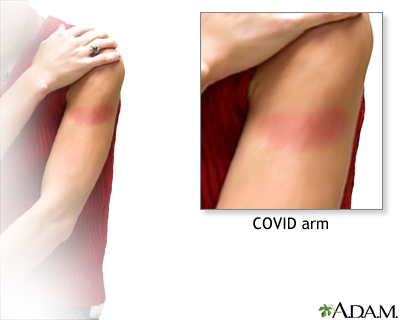COVID-19 vaccines - what to expect

COVID-19 vaccines protect people from getting COVID-19. They are a vital tool to help stop the COVID-19 pandemic. The vaccine works with your body’s immune system against the SARS-CoV-2 virus, which causes COVID-19.While COVID-19 vaccines will not make you sick, they may cause certain side effects and flu-like symptoms. This is to be expected. These symptoms may be a sign that your body is making antibodies against the virus. Fully vaccinated people can resume activities without wearing a mask or physically distancing, except where required by federal, state, local, tribal, or territorial laws, rules, and regulations, including local business and workplace guidance.

COVID-19 vaccines may cause certain side effects in some people. These symptoms can be a sign that your body is making antibodies against the virus. One common side effect is a red, itchy, warm, painful, swollen rash on the arm where you got the shot. This rash, which can be large, is also known as “COVID arm.” It may develop a few days to a week after getting the vaccine. While it may be uncomfortable, this reaction is harmless. You can take an antihistamine or an over-the-counter pain medicine to relieve itching and pain. Even if you have a rash after vaccination, it is important to get further shots as needed. If you are scheduled for a second shot, you may want to get it in the other arm or see if an alternative vaccine is available.
When to Call the Doctor
Contact your provider if you have any questions or concerns about COVID-19 vaccines.
In rare cases, people have had severe and non-severe allergic reactions to the COVID-19 vaccines. If you have a severe allergic reaction (anaphylaxis) after getting the first shot of the COVID-19 vaccine, you should not get the second shot. Talk with your provider to see if there are other options.
If you think you are having a severe reaction to a COVID-19 vaccine after leaving the vaccination site, you should call 911 or the local emergency number right away. Symptoms of severe allergic reaction appearing in the first 4 hours after receiving the vaccine include:
- Difficulty breathing, coughing, wheezing, or high-pitched breathing sounds
- Swelling of the face, eyes, tongue, or throat
- Hives, itchiness, redness of the skin
- Lowering of blood pressure
Symptoms of severe reactions may also include:
- Abdominal pain
- Chest discomfort or tightness
- Diarrhea
- Difficulty swallowing
- Dizziness or lightheadedness
- Nausea or vomiting
- Palpitations
- Slurred speech
- Unconsciousness
If you notice any unusual or concerning symptoms, seek medical care right away.
Rare cases of myocarditis (inflammation of the heart muscle) and pericarditis (inflammation of the outer lining of the heart) have been reported in children and teens ages 5 years and older after getting a COVID-19 vaccine.
This reaction has tended to occur more often in male adolescents and young adults ages 12 to 39 years. However, it also has occurred in females, in other age groups, after other doses, and after receiving the Novavax vaccine.
- It occurs more often after the second dose, most often within 7 days after vaccination. Studies show that this rare risk may be reduced by waiting 8 weeks between the first and second dose.
- With proper care and rest, most people who had the reaction got better quickly without any lasting effects.
- For people who had this rare reaction, it is important to talk with a cardiologist (heart doctor) about how and when to return to exercise and sports.
Symptoms of myocarditis and pericarditis include:
- Chest pain
- Shortness of breath
- Fast-beating heart, fluttering, or pounding heart
If your child or teenager has any of these symptoms, get medical help right away.
All these associations are so rare that they should not cause hesitation in receiving any of these vaccines.
CDC recommends that people may still get vaccinated if they have a history of:
- Severe allergic reactions NOT related to vaccines or injectable medicines -- such as food, pet, venom, environmental, or latex allergies
- Allergies to oral medicines or a family history of severe allergic reactions
References
Centers for Disease Control and Prevention website. Allergic reactions after COVID-19 vaccination.
Centers for Disease Control and Prevention website. Staying up to date with COVID-19 vaccines.
Version Info
Last reviewed on: 2/22/2023
Reviewed by: Frank D. Brodkey, MD, FCCM, Associate Professor, Section of Pulmonary and Critical Care Medicine, University of Wisconsin School of Medicine and Public Health, Madison, WI. Also reviewed by David C. Dugdale, MD, Medical Director, Brenda Conaway, Editorial Director, and the A.D.A.M. Editorial team. Editorial update 08/26/2024.
